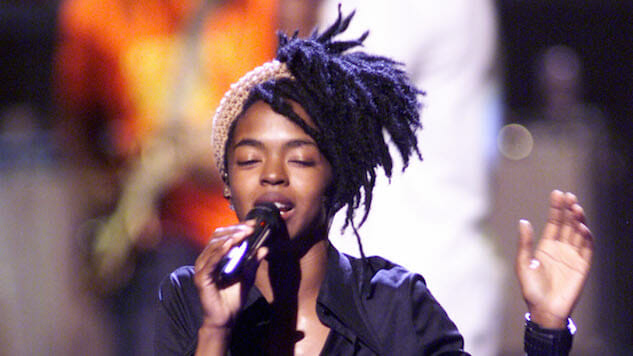The Miseducation of Lauryn Hill Turns 20; Revisit the Influential 1998 Album
Photo by Scott Gries/Getty
New Jersey singer and rapper Lauryn Hill was one of few artists to become an international superstar and musical game-changer with just one studio album to her name. Though she recorded two albums with hip-hop group the Fugees, alongside Wyclef Jean and Pras Michel, The Miseducation of Lauryn Hill was her jaw-dropping introduction to the world as a solo artist, but it would also become her only solo release. The album turns 20 years old this Saturday, so let’s revisit the legacy of one of the most defining and timeless records of the ’90s.
Much like Jeff Buckley and The Sex Pistols, Hill’s lone full-length LP has been mythologized for its juggernaut success and influence as it was later christened as a standout moment in popular music history. With its release in 1998, Hill helped bring about the mainstream breakthrough of neo-soul in the late ’90s along with D’Angelo’s Brown Sugar, Erykah Badu’s Baduizm and Maxwell’s Urban Hang Suite.
What made Hill’s album truly unique and influential was her blending of current neo-soul with R&B, hip-hop and reggae. She seamlessly transitioned from one genre to the other as her silky, dynamic voice shifted from singing to rapping, which beautifully came together with soulful keyboards, programmed beats, funky guitars and an angelic adornment of harp, strings, brass and timpani drums. The album also features vocal cameos from D’Angelo and Mary J. Blige and it even includes an unexpected guitar solo from Carlos Santana.
Hill has been cited as an influence by everyone from Beyonce, Nicki Minaj and TLC to Kanye West, Nas and John Legend. Her influence is also abundantly present among younger generations as she’s also been namedropped as an influence by Alessia Cara, Princess Nokia, H.E.R. and Bebe Rexha.
Nicki Minaj recently told Apple Music’s Beats 1 about the impact that Hill’s music had on her, “I remember crying to Miseducation when I first heard it, and I couldn’t believe that here was this queen, standing right before me. I had to bow down. I had to bow down, so she understood the level in which she changed my life and music for the rest of ever.”
The album’s open embrace of womanhood and feminism was inspiring and she skillfully portrayed both confidence and sensitivity when necessary. She was socially conscious, opposing the objectification of women in “Doo Wop (That Thing)”, unapologetically proclaiming her faith in “Forgive Them Father,” painting realistic scenes of her hometown and uprbringing in “Every Ghetto, Every City,” depicting the intricacies of relationships beyond physicality and lust in “Nothing Even Matters,” and coming to grips with the overwhelming feeling of one’s first pregnancy on “To Zion.”
Not only did Hill pave the way for female artists, she helped elevate hip-hop to a level that it hadn’t reached before. In 1998, the album became the first hip-hop album to win a Grammy for Album of the Year and she was nominated for 10 Grammys, a record for a female artists at the time. The album debuted at number one on the Billboard 200 chart, selling around 400,000 copies in its first week, which broke a record for first-week sales by a female artists.
-

-

-

-

-

-

-

-

-

-

-

-

-

-

-

-

-

-

-

-

-

-

-

-

-

-

-

-

-

-

-

-

-

-

-

-

-

-

-

-








































